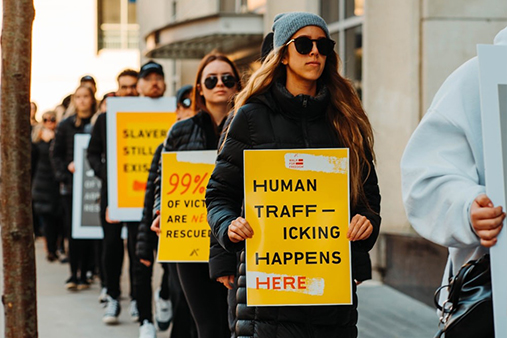
National Human Trafficking Awareness Day on January 11th brings attention to a crime that leaves a lasting toll on human life, families, and communities around the world.
Beginning in 2010, by Presidential Proclamation, each January has been designated National Slavery and Human Trafficking Prevention Month. Following the start of National Slavery and Human Trafficking Prevention Month, with the help of non-government organizations, National Human Trafficking Day began and is observed annually on January 11th.
Human trafficking is considered a modern form of slavery. This illegal act involves the use of force, fraud, or coercion to obtain labor or sex. Traffickers use violence, manipulation, or false promises to lure their victims, mostly young women, into trafficking situations. Trafficking victims usually experience physical and/or psychological abuse. They might also endure sexual abuse, food and sleep deprivation, threats to family members, and isolation from the outside world. Family members of the victim may also get threatened. It is closely related to domestic violence.
The goal of the day is to bring greater awareness to the crime of sex trafficking. Each year, organizations around the globe provide support to communities, training to volunteers and educational events to increase awareness.
HOW TO OBSERVE #HumanTraffickingAwarenessDay
One way to get involved is through the 31:8 Project. The organization works to equip and challenge society to proactively address issues regarding human trafficking. Human Trafficking takes away the voice of its victims and Project 31:8 aims to speak for them – Proverbs 31:8 – speak up for those who cannot speak for themselves.
Their work is on track to reach over people through presentations, training, webinars, and community projects. Visit their website at www.318project.org to learn more.
- Write or call your legislators and let them know your support policy that combats human trafficking.
- Support events that improve awareness in your community, schools, and neighborhoods.
- If you suspect someone is a victim of human trafficking, contact the National Human Tracking Hotline at 1-888-373-7888. You can also contact local law enforcement by calling 911. Some signs that a teen might be involved in human trafficking include but aren’t limited to: not coming home at night, new tattoos (of cherries, roses, dollar signs, or crowns), excessive crying, depression, exhaustion, secrecy, having older significant others, having many unknown adults on social media, STIs/STDs, or no longer engaging in regular social behaviors.
- Empower young people to make the decision to leave an unsafe or suspicious environment.
- Use #HumanTraffickingAwarenessDay to post on social media.

